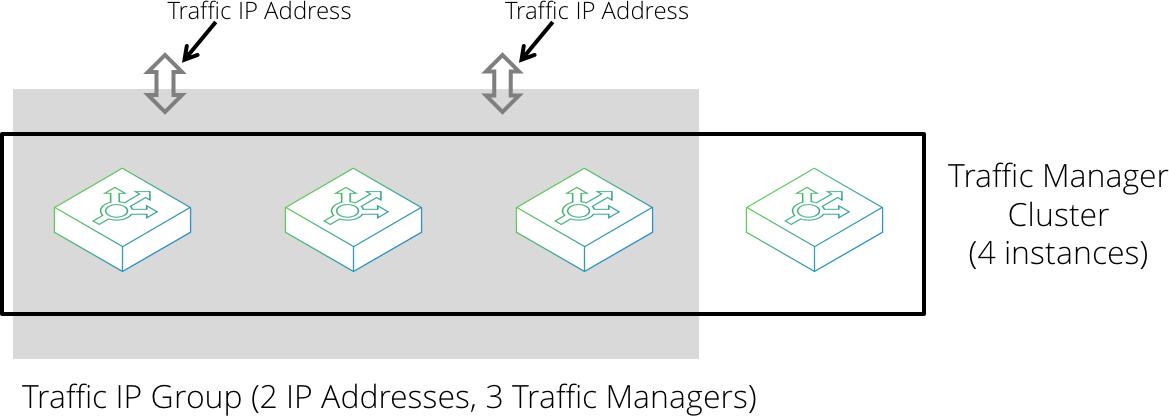Traffic IP Groups and Fault Tolerance
A cluster of Traffic Managers can distribute incoming network traffic between them, and transfer traffic shares from one to another if a Traffic Manager fails. Traffic distribution is configured by means of Traffic IP Groups.
The functionality referred to in this chapter might vary slightly depending on your product platform. For additional details and product specifications, see the Ivanti Web site at www.ivanti.com.
Fault Tolerance
Traffic IP Addresses and Traffic IP Groups
A “Traffic IP Address” is an IP address that must remain highly available. Traffic IP addresses are assigned to groups, called “Traffic IP Groups”.
Each Traffic IP Group is managed by some of (or all of) the Traffic Managers in your cluster. They cooperate and share the traffic between them, ensuring that any traffic to the Traffic IP addresses is distributed between and managed by one of the Traffic Managers in the cluster.

In the illustration above, a Traffic IP Group has been configured, spanning 3 of the 4 Traffic Managers in the cluster. This Traffic IP Group will manage the Traffic IP addresses, and the three Traffic Managers will ensure that those Traffic IP Addresses are available.
For example, a Web service might be published on IP address 34.56.78.90. You can ensure that the service is always available by adding that IP address to a Traffic IP group. The Traffic Manager cluster raises that IP address and manages all of the traffic to it. You would typically configure the DNS entry for your service to resolve to one or more Traffic IP addresses.
Distributing Traffic Within a Traffic IP Group
Traffic is shared between the Traffic Managers in your cluster using one of the following distribution policies:
•Single-Hosted mode: Each Traffic IP address is raised on one of the Traffic Managers in the group. If there are multiple IP addresses in the group, they are raised on different Traffic Managers, distributed as evenly as possible.
•Multi-Hosted mode: Each Traffic IP address is raised on all of the Traffic Managers in the group. Traffic to each IP address is evenly shared between all of the Traffic Managers.
•Route Health Injection: (not applicable to all product variants) Each RHI traffic IP group contains one active Traffic Manager, and optionally one passive Traffic Manager. All Traffic IP addresses in the group are raised privately (on loopback) by both participating Traffic Managers and dynamically advertised into the adjacent routing domain using OSPFv2 or BGP as the routing protocol. In response, routers direct all traffic to the active Traffic Manager.
Each Traffic Manager reports periodically to the others, and if one fails, the remaining Traffic Managers take over their share of traffic. In this way, services that depend on the Traffic IP addresses are always available.
For a discussion on example configurations of Traffic IP Groups, see Example Configurations. To understand how to create a Traffic Manager cluster, see Creating a Cluster.